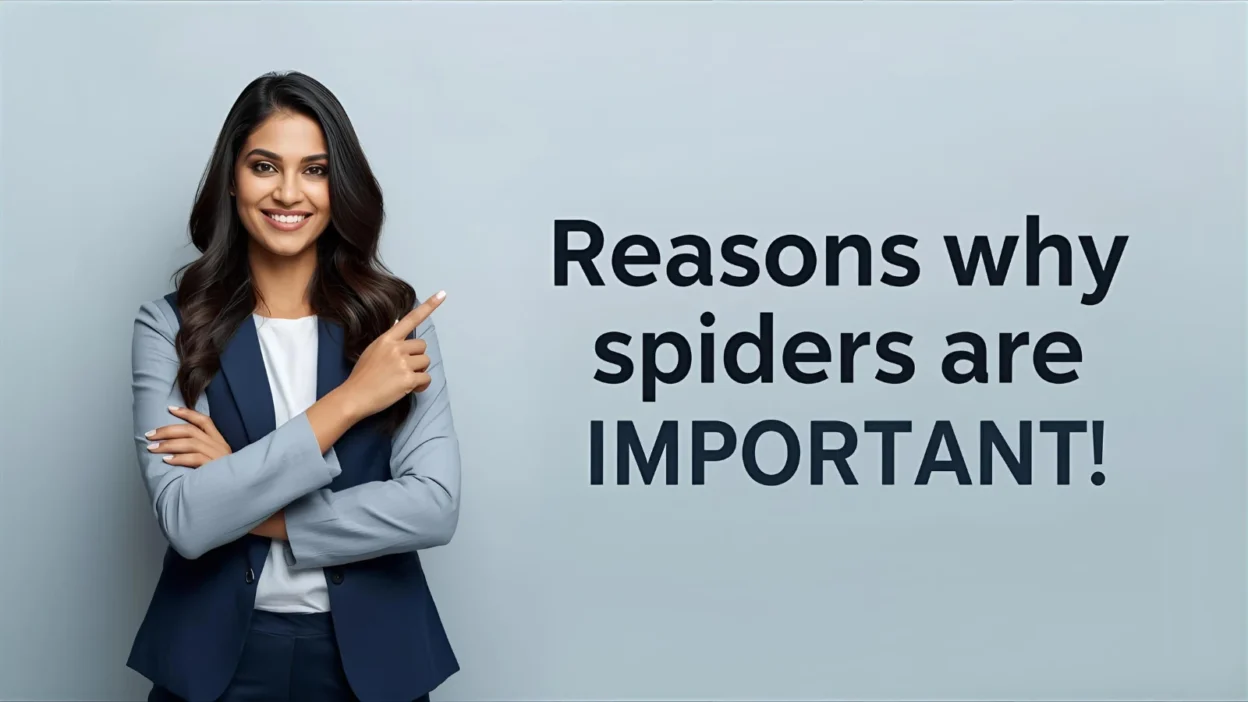Spiders often get a bad reputation — feared, misunderstood, and even squashed on sight.
But here’s the truth: spiders are vital to our planet’s health and survival.
These tiny eight-legged creatures play a huge role in maintaining ecosystems, controlling pests, and even inspiring science and technology.
Let’s dive into 55 compelling reasons why spiders are important — not just for nature, but for you too.
1. Spiders Control Insect Populations
Spiders are nature’s best pest controllers. They eat mosquitoes, flies, cockroaches, and crop-destroying insects.
🕷️ Example: A single spider can consume hundreds of insects every year!
💡 Fact: Without spiders, insect populations would grow uncontrollably, damaging crops and spreading disease.
2. They Help Maintain Ecological Balance
Spiders are crucial in the food web.
They keep insect populations in check, and in turn, become food for birds, lizards, and small mammals.
🌿 Example: In forests, spiders ensure no single species dominates, keeping biodiversity healthy.
💬 Quote: “Without spiders, the world would be overrun with bugs.”
3. Spiders Protect Crops Naturally
Farmers benefit from spiders more than they realize.
Instead of using harmful pesticides, spiders serve as organic pest control agents.
🌾 Example: Spiders in rice and corn fields protect crops from destructive pests.
💡 Fact: Spiders save farmers billions of dollars in pesticide costs globally.
4. They Keep Human Diseases in Check
By eating mosquitoes and flies, spiders help reduce the spread of diseases like malaria, dengue, and Zika virus.
🧬 Example: One spider in a corner may prevent dozens of mosquito bites!
💬 Tip: Instead of killing that harmless house spider — thank it for keeping you healthy.
5. Spiders Are Indicators of a Healthy Environment
When spiders thrive, it’s a sign of clean air, stable temperature, and balanced ecosystems.
🌍 Example: Scientists study spider populations to measure environmental health.
💡 Fact: Fewer spiders often mean pollution, pesticide overuse, or ecosystem imbalance.
6. Spider Silk Is a Marvel of Nature
Spider silk is stronger than steel by weight, yet lighter than cotton.
It’s flexible, biodegradable, and has inspired innovations in science and engineering.
🔬 Example: Researchers are using spider silk to develop medical sutures and bulletproof clothing.
💬 Quote: “Spider silk is nature’s blueprint for sustainable engineering.”
7. They Inspire Scientific and Medical Advancements
Spiders inspire innovations in robotics, biomaterials, and medicine.
Scientists study their venom for new painkillers and heart medicine.
🧪 Example: Spider venom has been researched for treating conditions like Alzheimer’s and strokes.
💡 Fact: The Australian funnel-web spider’s venom contains molecules that protect brain cells after a stroke.
8. Spiders Are Part of Ancient Culture and Mythology
Spiders symbolize creativity, patience, and connection across cultures.
🕸️ Example: In African folklore, Anansi the Spider represents wisdom and storytelling.
In Native American myths, the “Spider Woman” weaves life’s web of creation.
💬 Idiom: “Spin a web of wisdom” — means to craft something with care and patience.
9. Spiders Contribute to Soil Fertility
When spiders die or decompose, their nutrients enrich the soil.
Even their prey’s remains contribute organic matter that improves soil fertility.
🌱 Example: In forest floors, spider remains help recycle nitrogen and minerals.
💡 Fact: Every small creature — even a spider — plays a role in nature’s cycle.
10. They Help Balance Indoor Ecosystems
Believe it or not, spiders living indoors are beneficial.
They eat bugs like ants, moths, and flies — quietly keeping your home pest-free.
🏠 Example: The long-bodied cellar spider (“daddy longlegs”) eats other spiders and insects.
💬 Tip: House spiders are your natural pest control team — no monthly fee required!
11. Spiders Are Great Teaching Tools
Spiders help students learn about biology, adaptation, and evolution.
They’re fascinating examples of how nature builds complex systems efficiently.
🎓 Example: Teachers use spider webs to explain geometric patterns and ecological balance.
💡 Fact: Observing a spider’s hunting or web-building behavior teaches patience and observation.
12. They Inspire Art, Literature, and Symbolism
Artists and writers often draw inspiration from spiders.
From Charlotte in Charlotte’s Web to Marvel’s Spider-Man, they symbolize strength, creativity, and connection.
🎨 Example: The spider’s web has been used in paintings and architecture for centuries.
💬 Quote: “Like a spider, an artist weaves meaning out of the invisible.”
13. Spiders Are a Vital Food Source
Many animals rely on spiders for survival — including birds, frogs, and reptiles.
🦎 Example: Insects, small mammals, and amphibians depend on spiders for protein.
💡 Fact: Removing spiders would disrupt entire food chains.
14. Spiders Help Scientists Track Climate Change
Changes in spider populations can reveal shifts in temperature, humidity, and habitat conditions.
🌡️ Example: When certain spider species move north, scientists take it as a sign of warming climates.
💬 Fact: Spiders are “bioindicators” — living signals of environmental change.
15. Spiders Remind Us to Overcome Fear
Arachnophobia is common, but learning about spiders helps overcome unnecessary fear.
They remind us that understanding replaces fear with respect.
🕷️ Example: Most spiders are harmless — less than 1% are dangerous to humans.
💬 Idiom: “Face your fears — even if they have eight legs.”
🕸️ Types of Common Spiders and Their Roles
| Spider Type | Habitat | Benefit to Humans |
|---|---|---|
| Jumping Spider | Gardens, houses | Controls small insect pests |
| Orb-Weaver | Forests, fields | Builds webs that trap flies and moths |
| Wolf Spider | Grasslands, soil | Hunts harmful crop pests |
| Cellar Spider | Indoors | Eats mosquitoes and other spiders |
| Crab Spider | Flowers | Protects plants by eating pests |
| Trapdoor Spider | Underground | Improves soil structure |
💬 Common Idioms About Spiders and Webs
| Idiom | Meaning | Example |
|---|---|---|
| “Caught in a web of lies” | Trapped in deceit | He was caught in a web of lies after cheating. |
| “Spin a web” | Create a complex situation | The politician spun a web of confusion. |
| “Spider sense” | Intuitive feeling | My spider sense tells me something’s wrong. |
| “Busy as a spider” | Very active | She’s as busy as a spider weaving her dreams. |
🧠 Synonyms and Related Terms
| Word/Phrase | Meaning | Example |
|---|---|---|
| Arachnid | Class of animals including spiders | Spiders are arachnids, not insects. |
| Predator | Hunter organism | Spiders are efficient predators of insects. |
| Web Weaver | Spider that spins webs | The orb-weaver is a master web weaver. |
| Silk Producer | Spider known for silk | The golden silk orb-weaver spins golden threads. |
🌿 Real-Life Example: Spiders Saving Crops in Asia
In Asian rice fields, scientists found that spiders reduce pest populations naturally, cutting pesticide use by up to 70%.
💡 Lesson: Sometimes, the best farmer isn’t human — it’s a tiny eight-legged ally!
🧠 Grammar Tip: “Spider” or “Spiders”?
| Form | Usage |
|---|---|
| Singular | “A spider spins its web.” |
| Plural | “Spiders play a vital role in ecosystems.” |
| Possessive | “A spider’s silk is incredibly strong.” |
✅ Correct: “Spiders help balance nature.”
❌ Incorrect: “Spider helps balance nature.” (unless referring to one spider)
🌍 How to Protect Spiders Naturally
- Don’t kill harmless house spiders — relocate them outside.
- Avoid excessive pesticide use in gardens.
- Keep plants and soil healthy to support insects and spiders.
- Educate others about the ecological benefits of spiders.
- Support conservation programs protecting natural habitats.
💬 Tip: Protecting spiders means protecting nature itself.
❓ FAQs About Spiders
Q1: Are spiders dangerous to humans?
Most spiders are harmless; less than 1% pose any danger.
Q2: How do spiders help farmers?
They eat pests that damage crops, reducing pesticide dependency.
Q3: Why should we protect spiders?
They maintain ecological balance, improve soil, and prevent disease spread.
Q4: Do spiders have any medical value?
Yes! Their venom and silk inspire new drugs and materials.
Q5: Can spiders live indoors safely?
Yes, house spiders help control other insect populations naturally.
❤️ Conclusion
Spiders may seem creepy, but they’re tiny heroes of our world.
From protecting crops to inspiring innovation, spiders play an irreplaceable role in the web of life.
They remind us that every creature — no matter how small or scary — has a purpose.
So next time you see a spider in your room, maybe pause before reaching for that shoe.
It’s not an intruder — it’s an unsung guardian of balance, nature, and life itself.

Bret Lee writes educational and research-based content for Whygenix.com, focused on clarity, accuracy, and explaining why concepts matter through simple, engaging, reader-friendly writing.




